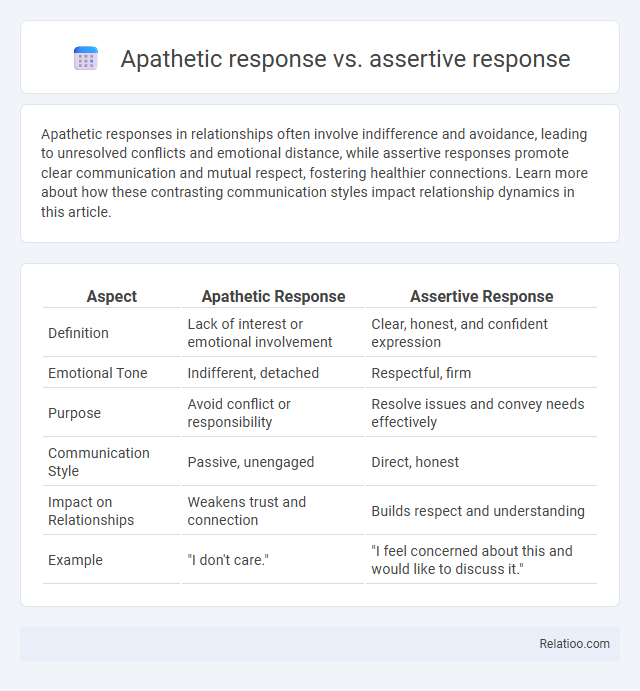Apathetic responses in relationships often involve indifference and avoidance, leading to unresolved conflicts and emotional distance, while assertive responses promote clear communication and mutual respect, fostering healthier connections. Learn more about how these contrasting communication styles impact relationship dynamics in this article.
Table of Comparison
| Aspect | Apathetic Response | Assertive Response |
|---|---|---|
| Definition | Lack of interest or emotional involvement | Clear, honest, and confident expression |
| Emotional Tone | Indifferent, detached | Respectful, firm |
| Purpose | Avoid conflict or responsibility | Resolve issues and convey needs effectively |
| Communication Style | Passive, unengaged | Direct, honest |
| Impact on Relationships | Weakens trust and connection | Builds respect and understanding |
| Example | "I don't care." | "I feel concerned about this and would like to discuss it." |
Understanding Apathetic Responses
An apathetic response reflects indifference or lack of emotional engagement, often signaling disinterest or avoidance in communication. Understanding apathetic responses helps you recognize disengagement and differentiate it from assertive responses, which express clear, confident, and direct communication of thoughts and feelings. Identifying these differences improves your ability to address emotional gaps and foster more effective interactions.
Defining Assertive Responses
Assertive responses clearly express thoughts, feelings, and needs while respecting others, promoting effective communication and healthy relationships. They differ from apathetic responses, which show indifference or lack of engagement, and aggressive responses, which violate others' rights and boundaries. Assertiveness involves confidence, clarity, and directness without hostility, fostering mutual understanding and conflict resolution.
Key Differences Between Apathetic and Assertive Reactions
Apathetic responses convey indifference and lack of engagement, while assertive responses demonstrate confidence and clear communication of needs or boundaries. Your ability to recognize these key differences enhances interpersonal interactions by fostering respect and understanding rather than detachment or passivity. Unlike apathetic reactions, assertive responses promote active problem-solving and emotional expression.
Psychological Roots of Apathetic Behavior
Apathetic responses stem from psychological roots such as learned helplessness, emotional fatigue, or depression, which diminish motivation and engagement in situations demanding action or emotion. In contrast, assertive responses are driven by confidence, self-efficacy, and emotional regulation, enabling individuals to express needs and boundaries effectively without aggression or passivity. Understanding the psychological underpinnings of apathy--often linked to trauma, chronic stress, or neurochemical imbalances--provides insight into why some individuals default to disengagement rather than assertive communication or reactive avoidance.
Benefits of Assertive Communication
Assertive communication enhances clarity, promotes mutual respect, and reduces misunderstandings by expressing thoughts and feelings confidently without aggression. Unlike apathetic responses that demonstrate indifference and often lead to unresolved conflicts, assertive responses foster healthier relationships and effective problem-solving. This communication style empowers individuals to set boundaries and advocate for their rights while maintaining empathy and openness.
Consequences of Apathetic Responses in Relationships
Apathetic responses in relationships often lead to emotional distance, decreased trust, and unresolved conflicts, ultimately weakening the bond between partners. Unlike assertive responses that foster open communication and understanding, apathy signals a lack of interest and care, causing frustration and resentment. Recognizing how your apathetic reactions impact your relationship can help you shift towards more constructive and engaged interactions.
How Assertiveness Fosters Healthy Boundaries
Assertive responses clearly communicate personal needs and boundaries, fostering mutual respect and preventing misunderstandings in relationships. Unlike apathetic responses, which express indifference and often lead to neglect of one's own rights, assertiveness encourages open dialogue and emotional honesty. This proactive communication style strengthens healthy boundaries by balancing self-respect with empathy towards others.
Recognizing Apathetic Patterns in Daily Life
Recognizing apathetic patterns in daily life involves noticing lack of emotional engagement, indifference, or avoidance in response to situations or interactions. Unlike assertive responses that express your thoughts and feelings clearly and respectfully, apathetic responses often show disengagement or passivity, hindering effective communication and problem-solving. Understanding these differences helps you identify when apathy affects your relationships and productivity, allowing you to adopt more assertive strategies for positive outcomes.
Strategies to Shift from Apathy to Assertiveness
Shifting from apathetic response to assertive response requires cultivating self-awareness and emotional engagement to recognize personal needs and boundaries. Implementing communication strategies such as using "I" statements, practicing active listening, and setting clear, respectful limits fosters confidence and clarity in interactions. Consistent reflection on values and goals, combined with role-playing assertive behaviors, strengthens the ability to replace passive indifference with proactive, empowered communication.
Building Long-Term Assertive Habits
Building long-term assertive habits involves recognizing the differences between apathetic, passive, and assertive responses to communication challenges. You develop emotional intelligence and confidence by consistently choosing assertive responses that express your needs and boundaries clearly without aggression or withdrawal. This proactive approach fosters healthier relationships and reinforces self-respect over time, minimizing misunderstandings and emotional burnout associated with apathetic or passive reactions.

Infographic: Apathetic response vs Assertive response
 relatioo.com
relatioo.com